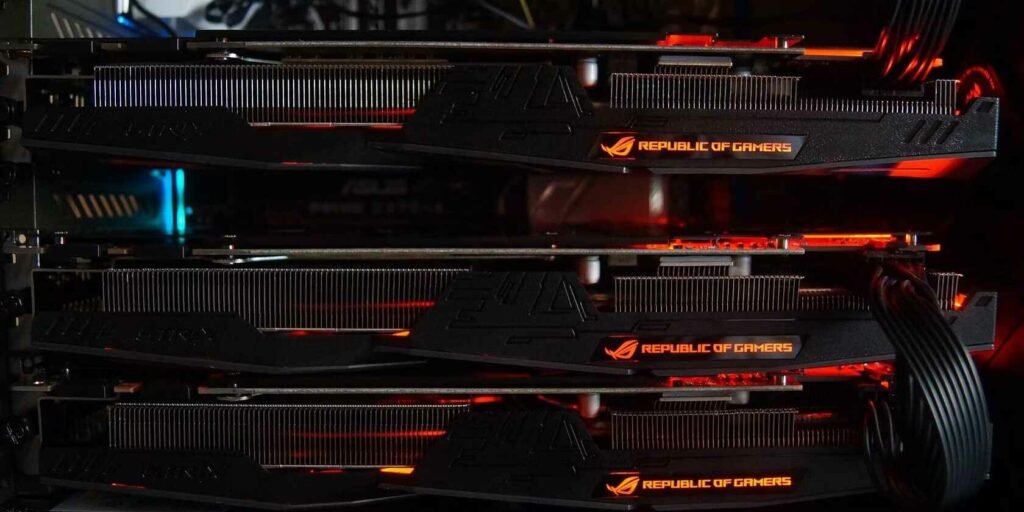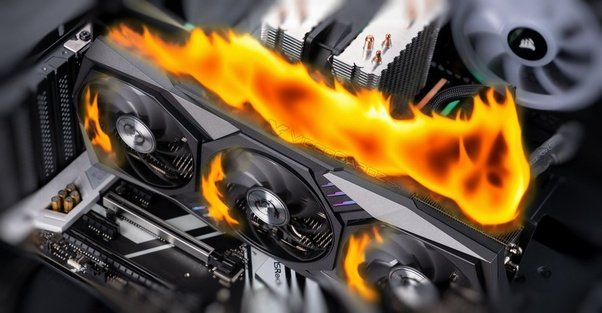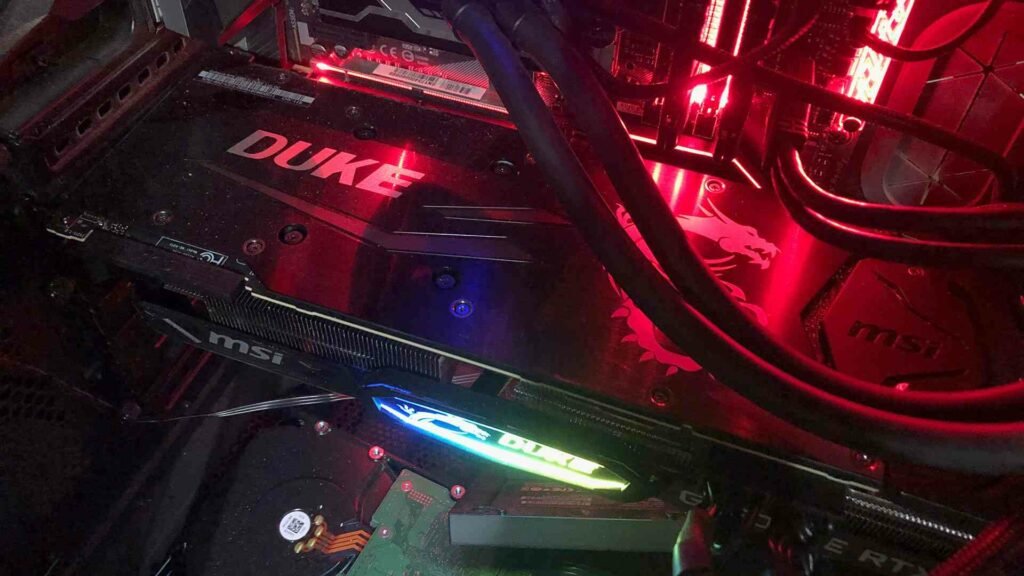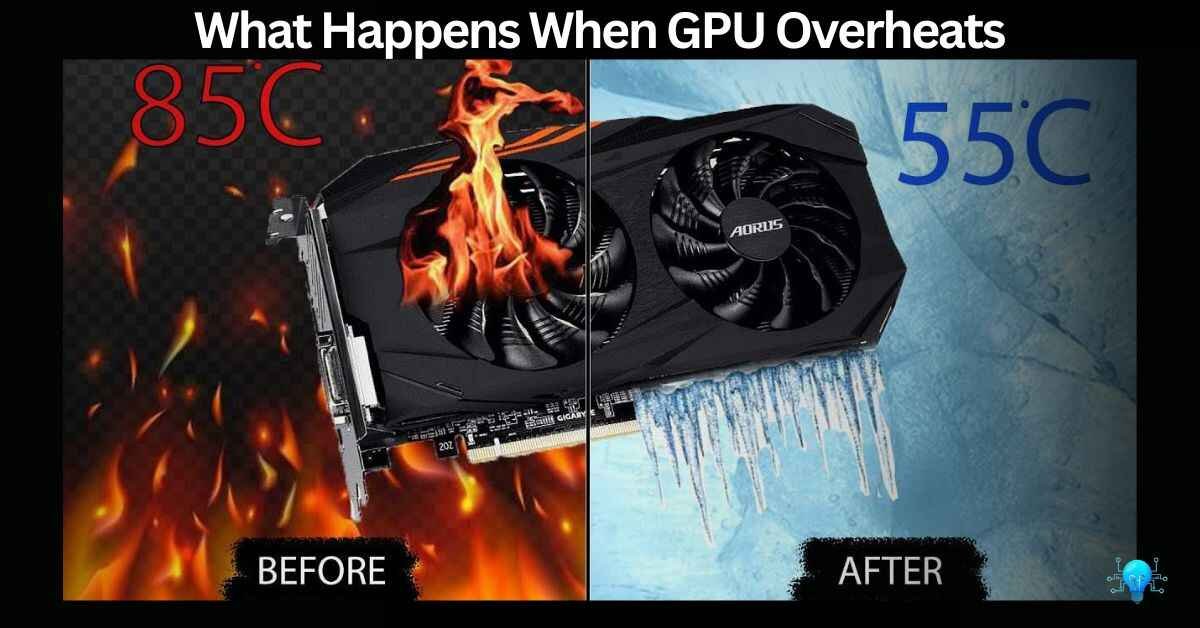Suddenly, my GPU started overheating. I noticed my computer getting louder, and the fans sounded like they were working overtime. I realized I had to address the overheating issue before it caused permanent damage.
When a GPU overheats, it can lead to a drop in performance, affecting your computer’s overall speed and functionality. Continued overheating may also cause permanent damage to your graphics card, impacting its long-term usability.
Join us as we discuss what happens when your GPU gets too hot. Learn about the temperatures that are too hot for your GPU and what you should be concerned about. Stay with us to find out how to keep your GPU running smoothly and your computer working well!
What Factors Can Cause GPU Overheating – Reasons You Should Know!
Heavy Usage:
When the GPU is under a heavy workload, such as gaming or video editing, it generates more heat, leading to overheating.
Dust and Dirt:
Collecting dust and dirt inside the computer case can block airflow, reducing the effectiveness of cooling systems and causing the GPU to overheat.
Poor Ventilation:
Poor airflow inside the computer case, caused by factors such as improper positioning of the graphics card or malfunctioning fans, can contribute to GPU overheating.

Inefficient Cooling Systems:
If the GPU’s cooling system, including fans and heatsinks, is not working efficiently, it may fail to dissipate heat effectively, leading to overheating.
Overclocking:
Lastly, Overclocking the GPU to increase performance can also lead to overheating if proper cooling measures are not in place.
What happens when a gpu overheats – Discover The Effects!
- Performance Drops: So, When The GPU overheats, it may reduce its performance to prevent further overheating, leading to decreased graphics performance and slower computer operation.
- System Instability: Overheating can cause system crashes, freezes, and other stability issues, disrupting your computing experience.
- Permanent Damage: Prolonged overheating can damage the GPU and other components, reducing their lifespan and potentially leading to hardware failure.
- Safety Mechanisms: To prevent damage, the GPU may activate safety mechanisms such as thermal throttling, reducing performance to lower temperatures.
- Risk of Shutdown: In extreme cases, the GPU may shut down to prevent damage, resulting in a loss of work or progress.
Addressing GPU overheating promptly is important to prevent these issues and ensure smooth computer operation.
Must Explore: What Is Normal GPU Usage While Gaming?
How to Cool Down the Overheating GPU – Solution Guide!
To stop your GPU from getting too hot, you can do a few things. Firstly, make sure your computer is clean. Dust and dirt can make your GPU overheat, so clean your computer often. Next, make sure your computer has good airflow. This means making sure your GPU is in the right spot in your computer and that its fans are working well.
You should also check your GPU’s temperature regularly. You can use special software to do this. If your GPU is getting too hot, you can add more fans or use special cooling systems to keep it cool. Lastly, try not to overclock your GPU. Overclocking can make it hotter, so it’s best to avoid it. By doing these things, you can stop your GPU from overheating. If you want to know about Do GPU Fans Always Spin click on it.
What Are The Optimal GPU Temperature Ranges – Keep It Cool!
The optimal temperature range for a GPU depends on the manufacturer and model. In general, most GPUs operate best between 60°C and 85°C under heavy load. However, temperatures below 60°C are entirely safe, while temperatures above 85°C may lead to reduced performance or overheating.
Do You Know? How Much GPU Utilization Is Normal? – Do This Rightly!
The best temperature for a GPU during gaming:
When you’re gaming, it’s good for your GPU to stay between 70°C and 85°C (158–185°F). NVIDIA GPUs usually run hotter than AMD ones, so it’s okay if your GPU’s temperature goes a bit above this range. But if it stays too hot for too long, it could damage your graphics card or make it last less time.
Is 80 Degrees Celsius Hot For A GPU – Stay Informed!
Typically, 80 degrees Celsius is considered hot for a GPU. While GPUs can handle high temperatures, sustained temperatures above 80°C can lead to reduced gpu performance, thermal throttling, and potentially, hardware damage. For more details, you can Click here.
Is 53°C GPU Temp Good?
Yes, a GPU temperature of 53°C is considered very good. This temperature indicates that your GPU is running efficiently and has adequate cooling. Typically, idle or light workload temperatures for GPUs range between 30°C and 50°C. Maintaining your GPU at this temperature helps ensure longevity and optimal performance. For more tips on maintaining good GPU temperatures up to 53C, check out our article.
Is 74°C Bad for Your GPU?
No, a GPU temperature of 74°C is not bad. Under load, modern GPUs can safely operate at temperatures up to 85°C without issues. 74°C is well within the safe operating range, indicating that your GPU’s cooling system is working effectively during intensive tasks. However, consistently higher temperatures might warrant better cooling solutions. For more details on managing high GPU temperatures, refer to our guide on is 74 degrees celsius hot for a gpu.
Can Overheating Your GPU Cause Shutdown – Take Action Now!
Yes, overheating your GPU can cause your computer to shut down unexpectedly. When a GPU gets too hot, it can trigger safety mechanisms that shut down the computer to prevent damage to the hardware.

If your GPU is overheating and causing your computer to shut down, it’s important to address the overheating issue to prevent further damage and ensure stable operation. For more information, you can check out this discussion on Reddit: GPU/CPU Overheat Causing PC Shutdown.
Is It Safe To Run A GPU At High Temperatures For Short Periods?
Yes, it’s generally safe to run a GPU at high temperatures for short periods. While modern GPUs can handle high temperatures, it’s essential to monitor them closely. Prolonged exposure to high temperatures can cause damage or reduce the lifespan of the GPU. Therefore, it’s important to keep an eye on the temperature and ensure it stays within a safe range.
Read Also: Do Both Monitors Need To Be Connected To The GPU? – My Strategy!
How To Check GPU Temperature In Windows – Easy& Simple!
To check your GPU temperature in Windows, you can use software like MSI Afterburner, GPU-Z, or HWMonitor. These programs provide real-time monitoring of your GPU’s temperature, allowing you to keep track of its temperature while using your computer. Additionally, you can often find the GPU temperature listed in the performance or monitoring tab of your graphics card’s control panel software.
Also Read: Can I Use a CPU Cable For GPU? – Warning!
Why is overheating bad for a GPU – Never Miss Out!
Overheating is bad for a GPU because it can damage the GPU and make it stop working correctly. When a GPU gets too hot, it can stop working correctly, slow down, or even break. Overheating can also make your computer crash or freeze more often. If a GPU gets very hot for a long time, it can even start a fire, which is dangerous.
What Effect Does GPU Temperature Have On Performance?
The GPU’s temperature affects its performance. When the GPU gets too hot, it slows down to cool off, which reduces its performance. This can cause lower frame rates and stuttering in games and other graphics-heavy tasks. So, it’s important to keep your GPU cool to maintain good performance.
Recent Post: My GPU Only Has 1 HDMI Port – Explore My Guide!
Why Is My GPU Hot When Gaming? – Leads to potential damage!
Your GPU gets hot when gaming because it’s working hard to render graphics and process data. Gaming puts a heavy load on the GPU, causing it to generate a lot of heat. Additionally, factors such as high graphics settings, poor ventilation, dust buildup, and overclocking can contribute to increased GPU temperatures while gaming.
You Should Know: What Is A Good GPU Clock Speed Mhz – Find Out Now!

GPU shutting down at 65-67c while playing games:
If your GPU shuts down while gaming at temperatures as low as 65-67°C, there might be a problem with its cooling system or temperature sensor. To fix this: Check the cooling system for dust and debris. Replace the thermal paste between the GPU and heat sink if dried. Update your graphics card drivers. Use software to monitor GPU temperature and check if the temperature sensor is working properly.
Never Miss: Can I Bring A GPU On A Plane? – 2024 Rules!
Can A GPU Overheat Due To A Faulty Power Supply – Consider Upgrading!
Yes, a faulty power supply can cause a GPU to overheat. If the power supply is not delivering enough power to the GPU, it may overheat as a result. Additionally, an unstable power supply can cause voltage fluctuations, which can also lead to overheating and potential damage to the GPU. Therefore, ensuring that your power supply is functioning correctly and providing sufficient power to your GPU to prevent overheating issues is essential.
Also Read: Do Both Monitors Need To Be Connected To The GPU? – My Strategy!
Frequently Asked Questions:
Is it OK for the GPU to be hot?
No, it’s not okay for the GPU to get too hot. While it’s normal for the GPU to get warm when you play games, it shouldn’t get too hot. If it gets too hot, it can cause damage to the GPU.
Can a GPU cause a PC to crash?
Yes, a GPU can cause a PC to crash if it overheats or encounters other issues. Overheating, faulty drivers, hardware issues, or other problems with the GPU can lead to crashes.
How often should I clean my GPU?
It’s recommended that you clean your GPU every few months to prevent dust buildup. Dust can block airflow and cause your GPU to overheat. Use compressed air to clean out the fans for optimal performance.
How hot can a GPU get before crashing?
A GPU can start to crash when it reaches temperatures above 90°C (194°F). However, this can vary depending on the GPU model and its specific thermal limits. It’s essential to monitor your GPU’s temperature and ensure it stays within a safe range to prevent crashing and other issues.
What temperature is too hot for my GPU?
Temperatures above 85-90°C are generally too hot for most GPUs and can cause thermal throttling or damage over time.
What happens if I ignore GPU overheating?
Ignoring GPU overheating can lead to reduced performance, crashes, and permanent hardware damage.
Should I replace my thermal paste?
Yes, replacing thermal paste every few years can help maintain optimal cooling and prevent overheating.
Closing Note:
When your GPU overheats, it can cause problems like reduced performance, crashes, and even hardware damage. Signs of overheating include strange things happening on your screen, your computer freezing or crashing a lot, and your GPU’s fans making more noise than usual.
To stop your GPU from overheating, ensure it stays clean, update its drivers, and monitor its temperature. If you do these things, you can keep your GPU working well and avoid damaging your computer.

